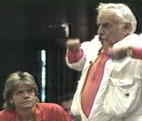Elgar, Alsop and Bernstein
 Sir Edward Elgar is currently suffering at the hands of my friends across the Atlantic. First blogger James Reel over at KUAT-FM in Southern Arizona set history straight by telling us that: 'If you are not English, you are more likely to perceive the Elgar Violin concerto as a thematically amorphous, bloated corpse of Romanticism. Sorry, Limeys: Elgar was not a great composer. He wrote a lot of lovely, endearing miniatures (and remember that the "Enigma" Variations are a series of miniatures), but only one large-scale work, the Cello Concerto, of truly international stature. Otherwise, Elgar, like Bruckner, is a provincial composer of severely flawed scores that fervent little fan clubs have bullied us into accepting as masterpieces.'
Sir Edward Elgar is currently suffering at the hands of my friends across the Atlantic. First blogger James Reel over at KUAT-FM in Southern Arizona set history straight by telling us that: 'If you are not English, you are more likely to perceive the Elgar Violin concerto as a thematically amorphous, bloated corpse of Romanticism. Sorry, Limeys: Elgar was not a great composer. He wrote a lot of lovely, endearing miniatures (and remember that the "Enigma" Variations are a series of miniatures), but only one large-scale work, the Cello Concerto, of truly international stature. Otherwise, Elgar, like Bruckner, is a provincial composer of severely flawed scores that fervent little fan clubs have bullied us into accepting as masterpieces.' Then last night, on BBC Radio 3, Marin Alsop showed us how it really should be done, in what the BBC presenter tactfully described as her first 'stab' at Elgar's mighty Second Symphony. Now as my photo sequence shows Ms Alsop was a pupil of Bernstein (that is Marin to the left), and, oh boy, did it show. She has clearly been listening to Lenny's infamous Enigma Variations recording which was universally panned, and described by one reviewer as 'excruciatingly slow, protracted, and mannered'. Alsop dutifully pulled the tempi in the E flat major Symphony all over the place with the final pages of the concluding Moderato e Maestoso taken so slowly that even the Bournemouth Symphony Orchestra players, who can busk with the finest, came close to breaking down. You can hear it via the BBC 'listen again' service until 31st March - if you must.
Then last night, on BBC Radio 3, Marin Alsop showed us how it really should be done, in what the BBC presenter tactfully described as her first 'stab' at Elgar's mighty Second Symphony. Now as my photo sequence shows Ms Alsop was a pupil of Bernstein (that is Marin to the left), and, oh boy, did it show. She has clearly been listening to Lenny's infamous Enigma Variations recording which was universally panned, and described by one reviewer as 'excruciatingly slow, protracted, and mannered'. Alsop dutifully pulled the tempi in the E flat major Symphony all over the place with the final pages of the concluding Moderato e Maestoso taken so slowly that even the Bournemouth Symphony Orchestra players, who can busk with the finest, came close to breaking down. You can hear it via the BBC 'listen again' service until 31st March - if you must. I'm afraid the return match I was trying to organise with Sir Adrian Boult conducting Charles Ives' Third Symphony isn't going to happen. So let's settle it at the soccer World Cup in Germany in June instead.
I'm afraid the return match I was trying to organise with Sir Adrian Boult conducting Charles Ives' Third Symphony isn't going to happen. So let's settle it at the soccer World Cup in Germany in June instead.Image credits, Marin soaks up the histrionics from Marinalsop.com. Image owners - if you do not want your picture used in this article please contact me and it will be removed. Report broken links, missing images and other errors to - overgrownpath at hotmail dot co dot uk
If you enjoyed this post take An Overgrown Path to Simply chic symphonies?









Comments
Charming...
So Karajan, Giulini, Jochum, Furtwangler, Horenstein, Sinopoli, Chailly, Celibidache, Tintner et al wasted all their time on wonderful performances and recordings of severely flawed scores for nothing?
If anybody could get Karajan and Celibidache in the same fan club they must have been doing something interesting...
So wrote Elgar in 1905 to his publisher Jaeger about the composition of his Introduction and Allegro.
Thank you Marcus for reminding us of how great that 'devil of a fugue really is.
Isn't it interesting that so many consider this magnificent work to be his finest, yet it is also his most classical in form?
I wonder how many of today's jet-set maestros would conduct ballet? (It is interesting that Antal Dorati was another fine ballet conductor).
Follow this link for more on Elgar's music for The Sanguine Fan.